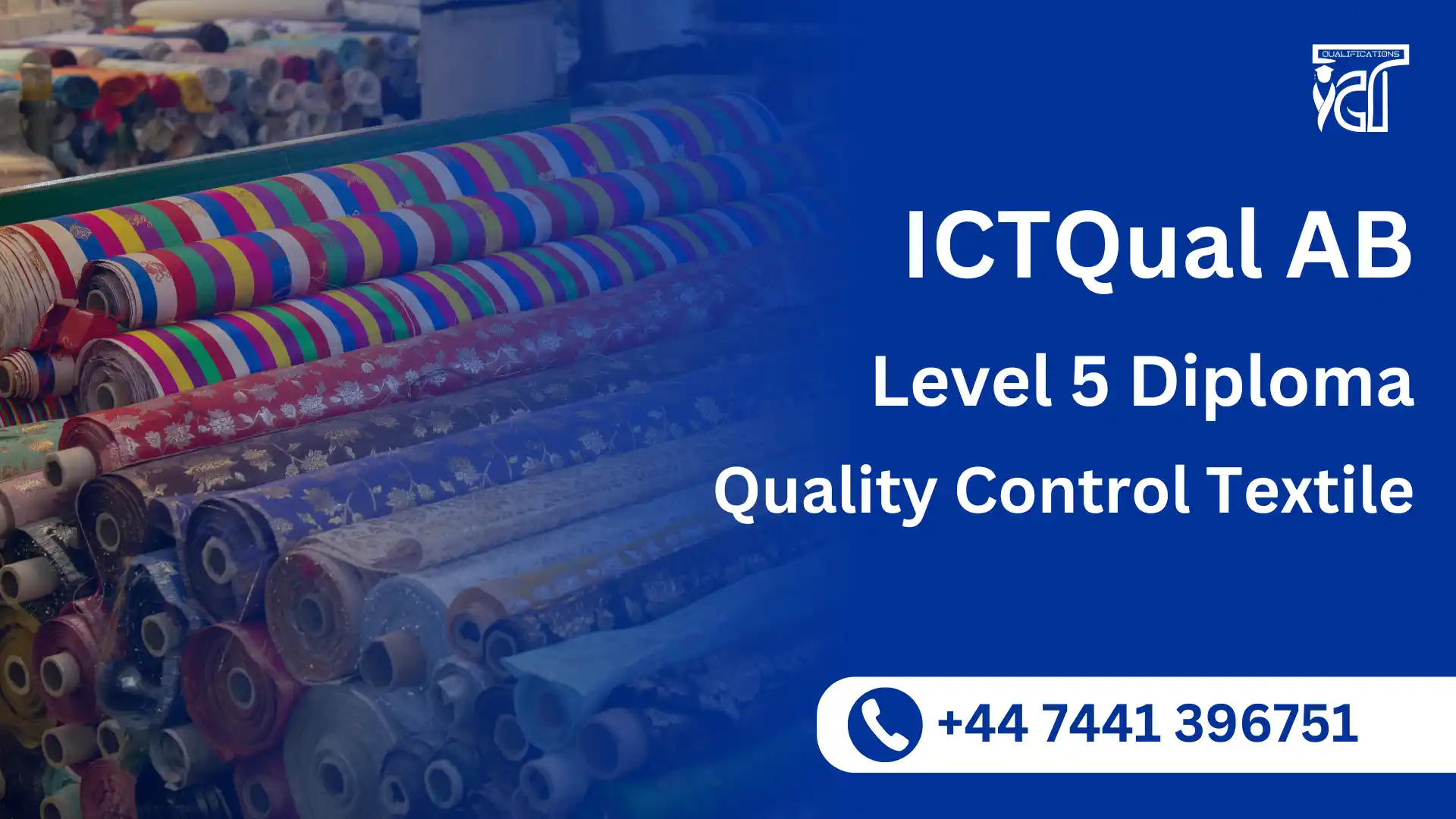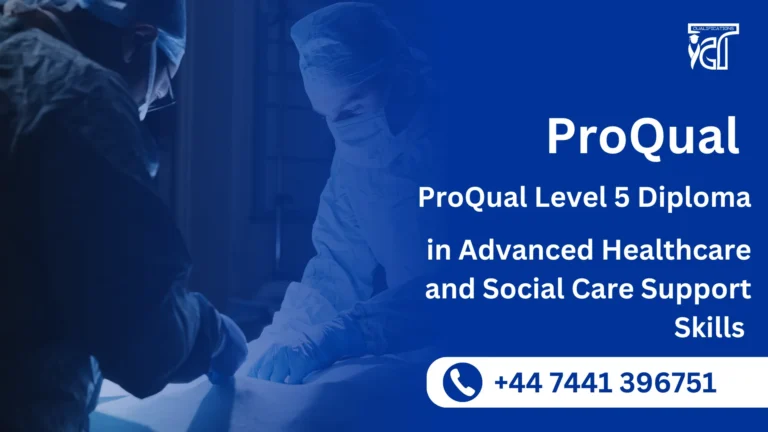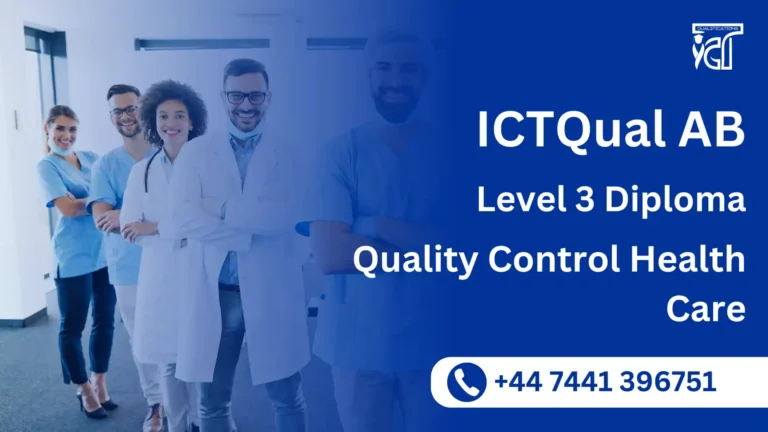The ICTQual AB Level 5 Diploma in Quality Control – Textile is a globally recognized qualification tailored for professionals aiming to lead quality assurance and control operations within the textile and garment manufacturing industry. As global demand for high-quality textile products continues to rise, this advanced diploma provides learners with the tools and strategic insight needed to manage complex quality systems, implement international standards, and ensure compliance at every level of the production process. It offers a blend of technical precision and managerial depth, ideal for individuals seeking to move into supervisory or leadership roles.
This program covers critical areas such as textile quality management systems (QMS), advanced inspection and testing techniques, root cause analysis, production audits, compliance documentation, and continuous process improvement strategies. Learners will also gain practical knowledge in handling customer complaints, setting up quality benchmarks, and improving operational efficiency through quality control integration. The curriculum is designed to reflect the real-world challenges faced by textile manufacturers and exporters in a competitive global market.
Whether you’re a senior quality officer, production manager, compliance coordinator, or experienced technician, the ICTQual AB Level 5 Diploma in Quality Control – Textile will sharpen your ability to uphold high standards, minimize product defects, and meet buyer specifications with consistency. Completing this diploma not only enhances your professional profile but also opens doors to higher-level career opportunities in textile mills, garment export houses, and quality-focused manufacturing units worldwide.
ICTQual AB Level 5 Diploma in Quality Control Textile
This qualification, the ICTQual AB Level 5 Diploma in Quality Control Textile, consists of 10 mandatory units.
- Quality Management Systems (QMS) in Textile Industry
- Technical Textile and Functional Fabric Evaluation
- Advanced Colourfastness and Dye Quality Control
- Supplier and Vendor Quality Assurance
- Product Lifecycle and Quality Integration
- Risk-Based Thinking in Textile QC
- Quality Costing and Resource Planning
- International Standards and Regulatory Compliance
- Research Project in Textile Quality Control
- Leadership and Strategic Quality Planning
Learning Outcomes for the Study Units:
1. Quality Management Systems (QMS) in Textile Industry
By the end of this unit, learners will be able to:
- Understand the principles and structure of Quality Management Systems (QMS) in textile operations.
- Design and implement QMS frameworks aligned with ISO 9001 and industry-specific standards.
- Monitor, evaluate, and improve quality processes within textile production and finishing units.
- Conduct internal quality audits and management reviews.
- Promote a culture of continuous improvement through quality policies and objectives.
2. Technical Textile and Functional Fabric Evaluation
By the end of this unit, learners will be able to:
- Identify and classify technical textiles and functional fabrics based on end-use performance.
- Apply advanced testing methods to evaluate fire resistance, water repellency, breathability, UV resistance, and antimicrobial properties.
- Analyze the impact of fabric structure and treatment on functional performance.
- Interpret test results for compliance with industry and client-specific standards.
- Recommend improvements in design or process to meet functional quality requirements.
3. Advanced Colourfastness and Dye Quality Control
By the end of this unit, learners will be able to:
- Evaluate dyeing processes and colourfastness properties (e.g. to washing, light, rubbing, perspiration).
- Identify root causes of dyeing defects such as shade variation, patchiness, and bleeding.
- Apply control measures to maintain colour consistency and batch-to-batch reliability.
- Use spectrophotometers and other colour evaluation tools for precision colour matching.
- Document and report colourfastness testing in alignment with international standards.
4. Supplier and Vendor Quality Assurance
By the end of this unit, learners will be able to:
- Develop criteria for evaluating and approving textile suppliers and vendors.
- Implement supplier quality audits and performance monitoring systems.
- Establish supplier quality agreements and compliance protocols.
- Apply corrective and preventive actions (CAPA) based on supplier non-conformance reports.
- Foster collaborative relationships to ensure supply chain quality and reliability.
5. Product Lifecycle and Quality Integration
By the end of this unit, learners will be able to:
- Understand the stages of the textile product lifecycle from concept to disposal.
- Integrate quality control checkpoints into design, development, production, and after-sales stages.
- Apply lifecycle thinking to minimize defects and ensure sustainability.
- Coordinate cross-functional teams to align quality objectives with business strategy.
- Use lifecycle data for continual quality improvement.
6. Risk-Based Thinking in Textile Quality Control
By the end of this unit, learners will be able to:
- Apply risk-based thinking in identifying potential quality failures and hazards.
- Use risk assessment tools such as FMEA (Failure Modes and Effects Analysis) and cause-and-effect diagrams.
- Prioritize risks and implement appropriate mitigation and monitoring strategies.
- Develop contingency plans to address supply, process, or quality disruptions.
- Incorporate risk-based decision-making into everyday quality control operations.
7. Quality Costing and Resource Planning
By the end of this unit, learners will be able to:
- Understand the components of quality costs: prevention, appraisal, internal failure, and external failure.
- Analyze and interpret cost of quality (CoQ) reports to identify improvement opportunities.
- Allocate quality resources efficiently to balance cost and performance.
- Plan budgets for quality assurance functions and investment in testing infrastructure.
- Advocate for quality improvement initiatives through cost-benefit analysis.
8. International Standards and Regulatory Compliance
By the end of this unit, learners will be able to:
- Interpret international standards relevant to textiles (e.g. ISO, AATCC, ASTM, OEKO-TEX, GOTS).
- Ensure compliance with health, safety, environmental, and ethical sourcing regulations.
- Prepare for external audits and certifications.
- Manage documentation and traceability systems for regulatory reporting.
- Promote ethical and sustainable practices across the supply chain.
9. Research Project in Textile Quality Control
By the end of this unit, learners will be able to:
- Identify and define a relevant research problem in textile quality control.
- Conduct a literature review and develop a structured research proposal.
- Collect, analyze, and interpret data using appropriate methodologies.
- Present research findings with clarity, accuracy, and academic rigor.
- Formulate practical recommendations for quality improvement based on evidence.
10. Leadership and Strategic Quality Planning
By the end of this unit, learners will be able to:
- Demonstrate leadership skills in driving quality initiatives within textile organizations.
- Develop and implement strategic quality plans aligned with business goals.
- Inspire and manage cross-functional quality teams to achieve KPIs.
- Use performance metrics and benchmarking to measure quality success.
- Lead organizational change efforts to foster a culture of quality excellence.
The ICTQual AB Level 5 Diploma in Quality Control – Textile offers extensive benefits for professionals seeking to enhance their expertise and leadership in textile quality assurance. This advanced-level program equips learners with both technical knowledge and strategic skills to implement, manage, and improve quality systems in textile production environments. Key benefits of the course include:
- Advanced Industry Knowledge:
Gain in-depth understanding of complex textile production processes, defect analysis, product testing techniques, and international quality control standards such as ISO and AATCC. - Leadership and Supervisory Skills:
Develop the ability to lead quality control teams, conduct quality audits, manage non-conformance reports, and implement preventive and corrective actions effectively. - Strategic Problem-Solving:
Learn how to identify root causes of quality issues, minimize production losses, and implement continuous improvement practices to enhance product quality and customer satisfaction. - Global Compliance and Standards Mastery:
Understand and apply global compliance requirements including sustainability, safety, and buyer specifications, enabling you to work with international textile markets. - Enhanced Employability and Career Growth:
This diploma positions you for senior roles such as Quality Control Manager, Compliance Officer, Production Quality Supervisor, or Lead Auditor in the textile industry. - Operational Efficiency:
Learn to streamline production workflows through quality-focused practices that reduce waste, control costs, and increase overall productivity. - Documentation and Reporting Skills:
Master documentation techniques such as inspection reports, deviation logs, audit checklists, and performance metrics tracking to support data-driven decisions. - Pathway to Higher Education or Specialization:
The Level 5 diploma provides a strong foundation for further qualifications in quality management, industrial engineering, or textile production leadership roles.
This diploma is an ideal investment for textile professionals committed to excellence, precision, and career advancement in a competitive and quality-driven industry.
The ICTQual AB Level 5 Diploma in Quality Control – Textile is specifically designed for individuals who aim to take on advanced responsibilities in managing quality systems within the textile and garment industry. It is best suited for professionals who already have foundational knowledge and experience in textile production or quality assurance and are ready to advance into supervisory, managerial, or specialized technical roles.
The ideal learner includes:
- Experienced Quality Control Professionals who are currently working in textile mills, garment factories, or export houses and wish to move into senior positions. These individuals benefit by upgrading their knowledge to meet global compliance standards and implement more efficient quality control practices.
- Textile Supervisors and Line Managers looking to deepen their understanding of quality management systems (QMS), production audits, root cause analysis, and defect prevention strategies. This course equips them with leadership and decision-making capabilities essential for high-responsibility roles.
- Production Technicians and Compliance Officers who wish to broaden their role by integrating quality control processes into operational planning, sustainability protocols, and customer satisfaction strategies.
- Graduates or Diploma Holders in Textile, Garment Technology, or Industrial Engineering who are seeking a qualification that bridges the gap between technical knowledge and leadership in quality assurance.
- Entrepreneurs and Business Owners in the textile and apparel manufacturing sector who want to improve the quality standards of their production facilities and ensure compliance with international buyer requirements.
- Individuals seeking international opportunities in textile quality roles, especially in export-oriented or multinational organizations that demand strong quality management skills and documentation expertise.
This course is ideal for learners who are analytical, detail-oriented, process-driven, and ambitious about making a measurable impact in the textile manufacturing process through quality control leadership.
Entry Requirements
Register Now
Qualification Process
Qualification Process for the ICTQual AB Level 5 Diploma in Quality Control Textile
- Self-Assessment:
Begin by evaluating your eligibility to ensure you meet the qualification requirements, including work experience, knowledge, and language proficiency. - Registration:
Complete your registration by submitting the required documents, including a scanned copy of a valid ID, and paying the registration fee. - Induction:
An assessor will conduct an induction to confirm your eligibility for the course and explain the evidence requirements. If you do not meet the criteria, your registration will be cancelled, and the fee will be refunded. - Assignments & Evidence Submission:
Provide all assignments and the necessary evidence based on the assessment criteria outlined in the course. If you are unsure of the required evidence, consult with the assessor for guidance on the type and nature of evidence needed. - Feedback and Revision:
The assessor will review your submitted evidence and provide feedback. Evidence that meets the criteria will be marked as “Criteria Met,” while any gaps will be identified. You will be asked to revise and resubmit if needed. - Competence Evidence:
Submit final evidence demonstrating that all learning outcomes have been met. This evidence will be marked as “Criteria Met” by the assessor once it is satisfactory. - Internal Quality Assurance (IQA):
The Internal Quality Assurance Verifier (IQA) will review your evidence to ensure consistency, quality, and compliance with standards. - External Verification:
The IQA will submit your portfolio to ICTQUAL AB External Quality Assurance Verifiers (EQA) for final confirmation. The EQA may contact you directly to verify the authenticity of your evidence. - Certification:
Upon successful completion of all checks, ICTQUAL AB will issue your official certificate, confirming that you have attained the ICTQual AB Level 5 Diploma in Quality Control Textile.







